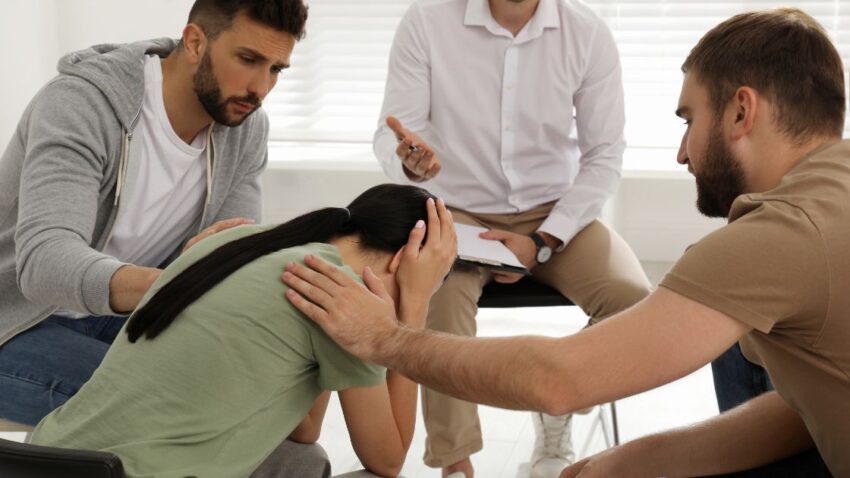When a loved one begins recovery, family therapy for addiction isn’t just helpful—it’s essential. It provides clarity, emotional repair, and a shared commitment to the healing process. Through family therapy, loved ones gain tools for understanding addiction, improving communication, and helping prevent relapse. It’s about healing the entire family unit, not just the individual.
Therapists create a space where resentments and confusion can be safely addressed, allowing family members to process their own pain while learning how to best support their loved one. The process fosters empathy, reduces blame, and helps families shift from crisis management to healing-oriented relationships.
Why Families Matter in Recovery
Studies indicate that family involvement in the recovery process greatly enhances outcomes: people with active family support successfully complete treatment more frequently, stay sober longer, and experience fewer relapses.
For the individual in recovery, a stable and supportive home environment is an empowering anchor. For the family, being involved in the process reinforces trust and emotional strength and empowers them with tools to sustain long-term recovery. Recovery is a team effort where everyone learns, heals, and grows together.
How to Structure a Powerful Support System
- Family Addiction Counselling & Family Therapy for Addiction
Restoring trust, reestablishing patterns of communication, and unearthing emotional traumas are all facilitated by professionally supervised family addiction therapy or family counseling for addiction. By reducing shame and enabling constructive support, a therapist helps the entire family see that addiction is a disease, not a failing
- Addiction Support Groups for Families
You can get connected with others who know the struggle by attending addiction support groups such as SMART Recovery Family & Friends, Nar-Anon, Families Anonymous, or Al-Anon. These organizations assist you in building emotional strength, setting boundaries, and learning the distinction between good helping and enabling.
- Intervention Services & Rehab for Families
Intervention services offered by Hope Rehabs help families compassionately confront a loved one’s addiction and encourage treatment enrollment. Rehab for families often includes:
- Joint family counselling
- Educational sessions for loved ones
- Workshops on relapse prevention and communication
This integrated support aligns everyone toward a common goal: lasting recovery.
- Helping a Loved One Recover: Practical Actions
- Attend family therapy sessions consistently
- Join addiction support groups as a family member
- Learn together about relapse triggers, boundaries, and accountability
- Promote healthy habits and rejoice at milestones
- Provide empathy—but don’t enable behaviors like covering up or continually providing money
Understanding the Role of the Family: Analogy & Data
Think of recovery as rebuilding a house after a storm. Your loved one is the structure—but the family is the foundation. Without solid supports like healthy communication, stability, and accountability, the entire rebuild risks collapse.
A large-scale study by the American Psychological Association in 2023 found that active family therapy participation significantly boosts recovery outcomes—including 35% higher treatment completion rates. Additionally, a World Health Organization report highlights that strong family bonds can reduce relapse risk by up to 40%.
These numbers make it clear: families aren’t just bystanders in recovery—they’re essential to long-term success.
Why Support Systems Lower Relapse Risk
- Consistent emotional presence: Feeling understood and supported reduces shame and isolation.
- Better detection of triggers: Family members can spot early warning signs and encourage re-engagement with treatment.
- Structured accountability: Regular check-ins, shared routines, and therapy reinforce responsibility.
- Shared understanding: Knowing addiction is a disease fosters empathy and patience.
Harmonizing with Hope Rehabs: Our Services
Hope Rehabs offers:
- Intervention Services: Compassionate facilitation to guide your loved one into treatment
- Family Therapy for Addiction: Structured counselling to realign relationships and communication
- Educational Sessions: Workshops on relapse prevention, boundary-setting, and recovery science
By combining rehab for families with ongoing family addiction counselling, Hope Rehabs supports both individual and family-wide transformation.
Taking the first step toward recovery as a family can feel overwhelming—but it’s also one of the most powerful moves you can make. With the right support system, healing is not only possible, it’s sustainable.
Confidential support is one click away – Contact Hope Rehabs (internal linking to contact page)
FAQs
- What is the distinction between family addiction counselling and an addiction support group for families?
Family addiction counselling is directed by professional therapists and targets the rebuilding of relationships, communication, and an understanding of addiction. Support groups are peer-driven and provide an arena for families to learn from each other and share experiences. Both are beneficial—counselling provides formal direction, and support groups provide ongoing community and emotional healing.
- Can family involvement backfire or enable addiction?
Yes, if left to their own devices, families can unwittingly reinforce addiction-supporting behaviors such as covering up or excuses. That’s why professional family therapy and organized support groups are so important—they establish healthy boundaries, hold people accountable, and turn support into something that really supports recovery rather than sabotaging it.
- How long should family therapy last?
There’s no set time frame. A lot of families start with weekly sessions in the beginning of recovery, and as progress is achieved, transition to bi-weekly or monthly sessions. Some go on for a year or more, particularly when deep patterns or trauma are present. It’s less about length and more about continued growth and healing.
- Are online support groups effective if I can’t attend in person?
Absolutely. Online support groups offer flexible, accessible help—perfect for families with time, mobility, or location constraints. Many reputable groups like Al-Anon, SMART Recovery Family & Friends, and others have virtual options that provide education, emotional validation, and a safe space to share challenges and wins.

